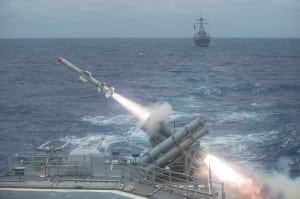The State Department has approved over $1.1 billion in potential foreign military sales with Taiwan, to include support for the Surveillance Radar Program and the sale of AGM-84L-1 Harpoon Block II missiles and AIM-9X Block II Sidewinder missiles.
The Defense Security Cooperation Agency (DSCA) notified Congress on Sept. 2 of the three new FMS cases.

“These proposed sales are routine cases to support Taiwan’s continuing efforts to modernize its armed forces and to maintain a credible defensive capability,” a State Department spokesperson said in a statement. “We urge Beijing to cease its military, diplomatic, and economic pressure against Taiwan and instead engage in meaningful dialogue with Taiwan. The United States will continue to support a peaceful resolution of cross-Strait issues, consistent with the wishes and best interests of the people on Taiwan.”
The largest of three deals is $665.4 million in support of the Taiwan’s Surveillance Radar Program, managed by Raytheon Technologies [RTX], which includes follow-on contractor logistics support, program management, minor modifications and upgrades and spare parts.
“The proposed sale will improve the recipient’s capability to meet current and future threats by ensuring continued operability of its Surveillance Radar Program (SRP), which provides improved situational awareness and threat warning capabilities critical to regional security,” the DSCA wrote in a statement.
Taiwan has requested to buy 60 of Boeing’s [BA] AGM-84L-1 Harpoon Block II missiles for $355 million, with the deal also covering four exercise missiles, Harpoon guidance control units, radar seekers, radar altimeters and captive air test missiles.
“The proposed sale will contribute to the modernization of the recipient’s capability to meet current and future threats by providing a flexible solution to augment existing surface and air defenses. The recipient will be able to employ a highly reliable and effective system to counter or deter maritime aggressions, coastal blockades, and amphibious assaults,” the DSCA said.
The $85.6 million deal for up to 100 of Raytheon’s AIM-9X Block II Sidewinder Tactical missiles also includes the sale of four tactical guidance units.
“The proposed sale will contribute to the modernization of the recipient’s capability to meet current and future threats as it will be able to employ a highly reliable and effective system to increase their warfighting effectiveness, as needed, which can counter or deter aggressions by demonstrated precision against air targets,” the DSCA said in its announcement.
The U.S.-Taiwan Business Council, which noted Taipei already possesses both AIM-9 and Harpoon missiles and has operated the Surveillance Radar Program for nearly a decade, offered support for the continued security assistance while criticizing the U.S.’ approach to announcing and assembling the package of deals.
“The Council has long opposed the ‘packaging’ of programs into a single batch of Congressional Notifications. It is an irregular use of the Foreign Military Sales process, where programs should be notified to Congress when they are ready, rather than bundled together. It raises the likelihood of politicized timing, and places stress on Taiwan’s budget process as its government has to manage the ebbs and flows of erratic sales,” Rupert Hammond-Chambers, the council’s president, said in a statement. “However, if the intention is to both boost Taiwan’s national security and make a political point to China, notifying this sale at 5:00 pm on a holiday weekend is a failing grade. Attempts to bury so-called ‘sensitive’ arms sales announcements late in the day or before a 3-day weekend have happened in the past as well. It appears that one faction within the Biden Administration wants to make a solid point to [China] about material support for Taiwan in the face of [Chinese military] pressure, while another seems to want to minimize that point by announcing it the evening before a long weekend.”